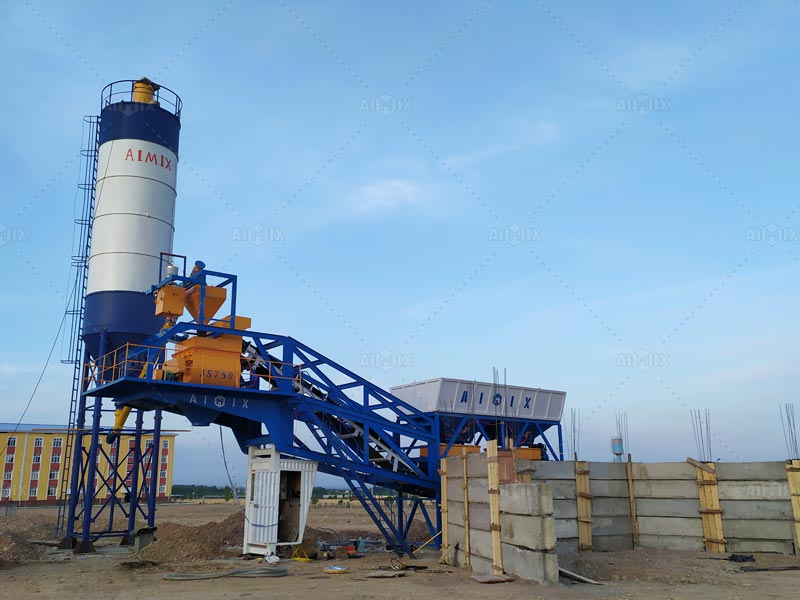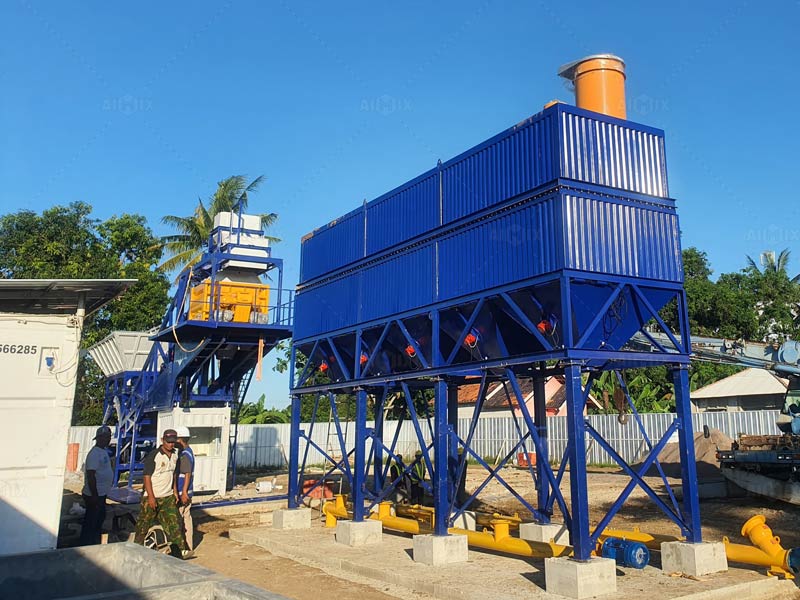Customizing a mobile concrete plant involves careful consideration of various factors to ensure that the plant meets your specific operational needs. A mobile concrete plant offers flexibility and efficiency for construction projects that require high-quality concrete at different locations. Whether you are opting for a mobile concrete plant for a small-scale project or a larger-scale one, understanding the key factors to consider can help you make the best decision. In this article, we will discuss the important aspects you need to focus on when customizing your mobile concrete plant.

Key Factors to Consider When Customizing a Mobile Concrete Plant
1. Capacity Requirements
The capacity of the mobile concrete plant(planta de concreto movil) is one of the first things to consider when customizing it. The plant’s capacity is usually measured in terms of the amount of concrete it can produce per hour (m³/h). The required capacity depends on the scale and type of construction project you’re involved in. For instance, a small-scale project may only require a mini concrete plant with a capacity of 20-30 m³ per hour, while larger projects may require plants with capacities of 60 m³ or more per hour.
When determining your plant’s capacity, also take into account the production demands and the number of shifts the plant will operate per day. Overestimating or underestimating your capacity needs could lead to inefficiency and increased operational costs.
2. Customization of Mixing Technology
The type of mixing technology used in a mobile concrete plant is crucial for producing high-quality concrete. There are several types of concrete mixers that can be included in your customized mobile concrete plant:
- Single Shaft Mixer: Offers simple structure and low maintenance but may not be as efficient for large production.
- Twin Shaft Mixer: Known for producing high-quality concrete with better efficiency and faster mixing time, ideal for larger projects.
- Planetary Mixer: Provides high uniformity and is often used for specialty concrete production.
Choosing the right mixer type for your mobile concrete batching plant depends on your production needs, the types of concrete you intend to produce, and the available budget.
3. Mobility and Transportability
One of the main advantages of a mobile concrete plant is its mobility. When customizing your plant, you need to pay attention to how easily it can be transported to various job sites. Ensure that the plant can be easily dismantled, relocated, and reassembled with minimal downtime. Factors like weight, size, and whether it needs to be transported via flatbed or standard truck should be considered.
If your project involves frequent relocation, it’s advisable to go for a highly portable plant with simple assembly features. A well-designed mobile plant will allow for quick setup, reducing project delays.
4. Power Supply and Energy Efficiency
Power consumption is another critical factor when customizing a mobile concrete plant. While most plants are powered by electricity, it is important to choose a plant that can either operate on a local grid or with alternative energy sources, such as diesel generators, depending on the location of your project.
Energy-efficient mobile concrete plants not only help reduce operational costs but also contribute to environmental sustainability. Look for plants that feature energy-saving technologies, such as variable frequency drives (VFDs) for motors and energy-efficient batching systems.
5. Automation and Control System
Automation is an important feature to consider in the customization of a mobile concrete plant. A fully automated control system enables you to operate the plant with greater precision, consistency, and efficiency. The control system can handle mixing ratios, monitor plant performance, and even provide real-time data on output and material usage.
When selecting the control system, it’s essential to consider ease of use, whether it supports remote monitoring, and the level of customization available. Some systems allow for integration with mobile apps for on-the-go management, which can be particularly useful for managers and operators at remote job sites.
Additional Features to Consider in Your Mobile Concrete Plant
1. Raw Material Storage and Batching Systems
In a mobile concrete plant, the storage of raw materials (cement, aggregates, water, and admixtures) plays a crucial role in maintaining production efficiency. Customizing the plant’s raw material storage capacity is important for preventing delays caused by material shortages.
Additionally, ensure the batching system is precise and can handle various material types. This will help avoid quality issues such as over-mixing or under-mixing. Automatic batching systems are often preferred as they ensure uniformity and minimize human error.
2. Dust and Waste Management Systems
Dust control is crucial in a mobile concrete plant, particularly when it is situated in urban or industrial areas. Effective dust suppression systems will help maintain environmental standards and protect the health of workers.
Waste management features are also important. Ensure the plant(planta dosificadora de concreto) is equipped with mechanisms to recycle excess materials like water and aggregates. Many modern plants now feature closed-loop water systems that help in reducing water wastage.
3. Safety and Compliance Features
Safety is a top priority when customizing any plant. Ensure your mobile concrete plant includes safety features such as emergency shutdown systems, proper guardrails, and non-slip surfaces for workers. Additionally, compliance with local safety regulations and environmental standards is essential to avoid legal issues and penalties.

Cost Considerations for Customizing a Mobile Concrete Plant
1. Initial Investment and Concrete Plant Price
The concrete plant price(planta de concreto precio) will depend on several factors such as the size, capacity, automation, and features of the plant. A mini concrete plant may cost anywhere between $30,000 to $100,000, while more advanced models with high production capacities and additional features can exceed $200,000.
It’s important to create a detailed budget that includes the cost of raw materials, transport, installation, and operational costs. The cost should also account for customization features that may increase the plant’s price.
2. Maintenance and Operating Costs
After the initial investment, ongoing maintenance and operating costs should be considered when customizing a mobile concrete plant. Regular maintenance ensures the longevity and efficient functioning of the plant. The key operating costs will include labor, power consumption, and fuel (if using generators), as well as wear and tear on components such as mixers and conveyors.
3. Return on Investment (ROI)
When customizing a mobile concrete plant, it’s crucial to calculate the expected ROI based on your plant’s output and the anticipated market demand for concrete. A well-chosen and well-maintained plant can generate high returns, particularly if it is used efficiently across multiple projects.
Conclusion
Customizing a mobile concrete plant is an exciting venture that requires careful planning and consideration of various factors. Whether you are purchasing a mini concrete plant(mini planta de concreto) for small-scale projects or a larger, more complex system, understanding the capacity, mobility, automation, and cost factors is key to ensuring your plant meets project needs effectively. By paying attention to the right customization features and planning for operational costs, you can achieve long-term efficiency, productivity, and profitability in your construction projects.